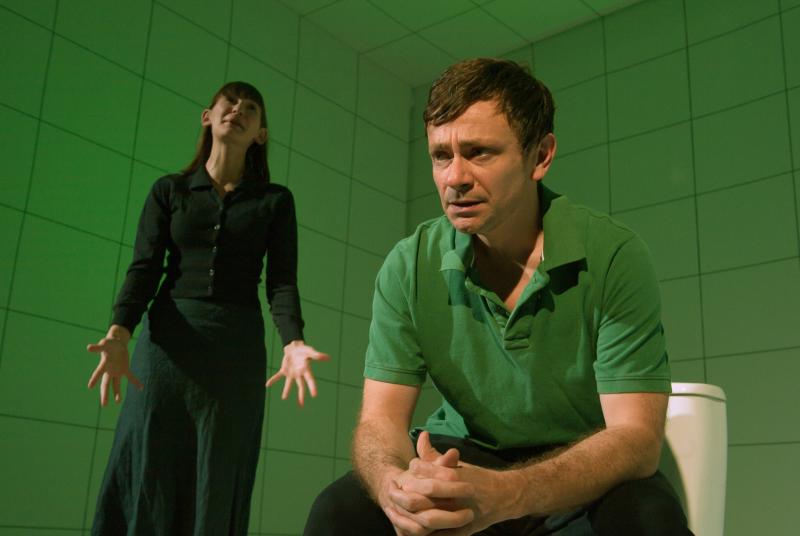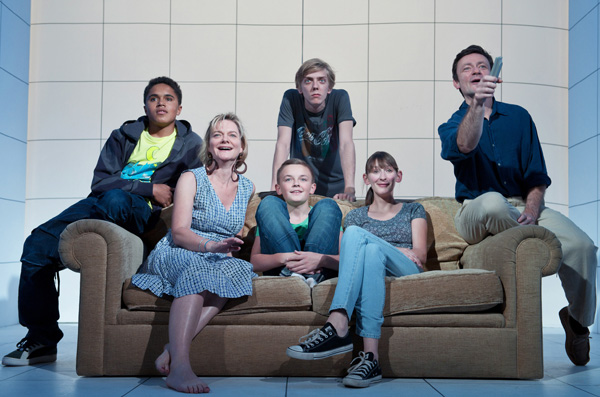Love and Information, Royal Court Theatre | reviews, news & interviews
Love and Information, Royal Court Theatre
Love and Information, Royal Court Theatre
The latest from Britain’s best playwright is a fast-moving but chilly panorama of life today

In the non-Olympic sport called “Name Britain’s greatest living playwright”, most of the contestants have always been men. Nowadays, that is all changed and the odds-on favourite would be Caryl Churchill, who has been creating provocative and boundary-busting drama for four decades.
The same can just about be said of her latest. The play has no named characters, and consists of a cascade of short dialogues which on the page are a challenge to director, in this case James Macdonald, and actors alike. Before the play can be staged, its meaning and its situations must first be discovered by the company. They are free to invent almost anything. From the title, Love and Information, we can understand that this is a play about the need to know and the need to love. But how is that shown?
This panorama of everyday life is very English
Each scene is seemingly unconnected to the any other. So 16 actors play dozens of different characters in some 50 scenes that are organised into seven sections. The running time is about 100 minutes, which means that some scenes are two or three minutes long, and many much shorter. The settings include the most familiar locations of modern life: the sofa, the double bed, the kitchen table, train, airport, canteen, garden, a sauna, a remote farm with no mobile phone signal, a room being decorated, a rainy day on the beach. And more.
The characters are equally varied and equally recognisable: lovers, couples, married couples, families, mothers and daughters, mothers and sons. Office workers and friends, scientists and celebrity-obsessed teens. Some believe in God, others are disturbed. Some traumatised. It’s all very English, this fast-moving panorama of everyday life: the culture of secrecy, Radio Four jingles, Big Ben chimes, the wedding video, the hobbies and the fads. People compete in ballroom dancing contests; there is a cricket pitch.
Out of these tiny slivers of theatrical information, Churchill provides teasing glimpses of bigger stories. A celebrity in hiding, a hidden affair, a family secret, a traumatic accident, and especially the devastation of depression. And the whole play pulses with questions: is it better to know things — or not? How does knowing a secret affect a love relationship? Is it best not to know? What are the things that only a couple knows? What does God, or natural disasters, or irrational numbers, mean? Really mean. When our memory goes, does our identity crumble?
 In these questions, confessions, disclosures, betrayals and bemusements, some secrets are shown to have advantages and some to be destructive. Some forms of love seem stronger than others. Sometimes having no feelings seems like a reasonable response; at other times, it is the absence of love. Occasionally, you catch the silence of deep grief. Some information makes a difference; some doesn’t. One young man falls in love with a virtual girl. Foolish.
In these questions, confessions, disclosures, betrayals and bemusements, some secrets are shown to have advantages and some to be destructive. Some forms of love seem stronger than others. Sometimes having no feelings seems like a reasonable response; at other times, it is the absence of love. Occasionally, you catch the silence of deep grief. Some information makes a difference; some doesn’t. One young man falls in love with a virtual girl. Foolish.
Churchill’s writing is typically nimble, and this open text is squarely in the long tradition of Samuel Beckett, Martin Crimp, Sarah Kane and more recently Simon Stephens. It's more mannerist than innovative. But she does provide a wealth of material, about technology as much as about feeling. It's a play throbbbing with intelligence. So although she makes available little spasms of empathy, moments of connection, the big picture is of a chilly world suffering from information overload. In the play, as in the world we live in, there is too much information. And the traumatised and those afflicted by mental illness are here powerful metaphors for the human condition.
Macdonald’s vivid production has a white cube set by Miriam Buether, and his pacing and vision are hard to fault. The large cast are never in any particular role for long enough to engage the audience, so it would be odd to single out individuals from the 16 hardworking actors (some pictured above right), a couple of whom are making their stage debuts. Like a modernistic work of art, this is a minimalist evening, with the repetition of gestures being an integral part of its meaning. After a while, the novelty wears a bit thin, and it is easier to respect than to enjoy. Or rather, it’s easier to admire the information than to feel the love.
rating
Explore topics
Share this article
Add comment
The future of Arts Journalism
You can stop theartsdesk.com closing!
We urgently need financing to survive. Our fundraising drive has thus far raised £49,000 but we need to reach £100,000 or we will be forced to close. Please contribute here: https://gofund.me/c3f6033d
And if you can forward this information to anyone who might assist, we’d be grateful.

Subscribe to theartsdesk.com
Thank you for continuing to read our work on theartsdesk.com. For unlimited access to every article in its entirety, including our archive of more than 15,000 pieces, we're asking for £5 per month or £40 per year. We feel it's a very good deal, and hope you do too.
To take a subscription now simply click here.
And if you're looking for that extra gift for a friend or family member, why not treat them to a theartsdesk.com gift subscription?
more Theatre
 Measure for Measure, RSC, Stratford review - 'problem play' has no problem with relevance
Shakespeare, in this adaptation, is at his most perceptive
Measure for Measure, RSC, Stratford review - 'problem play' has no problem with relevance
Shakespeare, in this adaptation, is at his most perceptive
 The Importance of Being Earnest, Noël Coward Theatre review - dazzling and delightful queer fest
West End transfer of National Theatre hit stars Stephen Fry and Olly Alexander
The Importance of Being Earnest, Noël Coward Theatre review - dazzling and delightful queer fest
West End transfer of National Theatre hit stars Stephen Fry and Olly Alexander
 Get Down Tonight, Charing Cross Theatre review - glitz and hits from the 70s
If you love the songs of KC and the Sunshine Band, Please Do Go!
Get Down Tonight, Charing Cross Theatre review - glitz and hits from the 70s
If you love the songs of KC and the Sunshine Band, Please Do Go!
 Punch, Apollo Theatre review - powerful play about the strength of redemption
James Graham's play transfixes the audience at every stage
Punch, Apollo Theatre review - powerful play about the strength of redemption
James Graham's play transfixes the audience at every stage
 The Billionaire Inside Your Head, Hampstead Theatre review - a map of a man with OCD
Will Lord's promising debut burdens a fine cast with too much dialogue
The Billionaire Inside Your Head, Hampstead Theatre review - a map of a man with OCD
Will Lord's promising debut burdens a fine cast with too much dialogue
 50 First Dates: The Musical, The Other Palace review - romcom turned musical
Date movie about repeating dates inspires date musical
50 First Dates: The Musical, The Other Palace review - romcom turned musical
Date movie about repeating dates inspires date musical
 Bacchae, National Theatre review - cheeky, uneven version of Euripides' tragedy
Indhu Rubasingham's tenure gets off to a bold, comic start
Bacchae, National Theatre review - cheeky, uneven version of Euripides' tragedy
Indhu Rubasingham's tenure gets off to a bold, comic start
 The Harder They Come, Stratford East review - still packs a punch, half a century on
Natey Jones and Madeline Charlemagne lead a perfectly realised adaptation of the seminal movie
The Harder They Come, Stratford East review - still packs a punch, half a century on
Natey Jones and Madeline Charlemagne lead a perfectly realised adaptation of the seminal movie
 The Weir, Harold Pinter Theatre review - evasive fantasy, bleak truth and possible community
Three outstanding performances in Conor McPherson’s atmospheric five-hander
The Weir, Harold Pinter Theatre review - evasive fantasy, bleak truth and possible community
Three outstanding performances in Conor McPherson’s atmospheric five-hander
 Dracula, Lyric Hammersmith review - hit-and-miss recasting of the familiar story as feminist diatribe
Morgan Lloyd Malcolm's version puts Mina Harkness centre-stage
Dracula, Lyric Hammersmith review - hit-and-miss recasting of the familiar story as feminist diatribe
Morgan Lloyd Malcolm's version puts Mina Harkness centre-stage

Comments
Love and Information is not a
I was unfortunate enough to